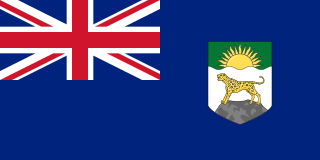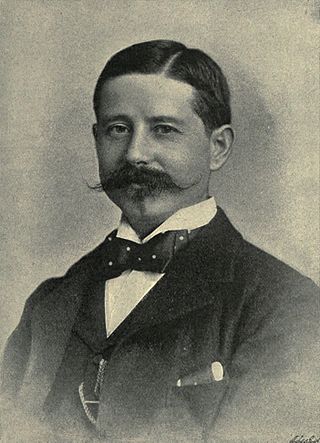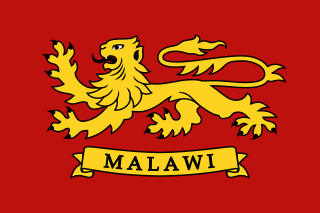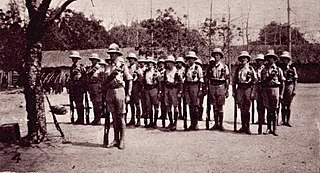Related Research Articles

Malawi, officially the Republic of Malawi and formerly known as Nyasaland, is a landlocked country in Southeastern Africa. It is bordered by Zambia to the west, Tanzania to the north and northeast, and Mozambique to the east, south and southwest. Malawi spans over 118,484 km2 (45,747 sq mi) and has an estimated population of 19,431,566. Malawi's capital and largest city is Lilongwe. Its second-largest is Blantyre, its third-largest is Mzuzu and its fourth-largest is its former capital, Zomba. It was the first capital city of Malawi before being changed to Lilongwe.
The History of Malawi covers the area of present-day Malawi. The region was once part of the Maravi Empire. In colonial times, the territory was ruled by the British, under whose control it was known first as British Central Africa and later Nyasaland. It becomes part of the Federation of Rhodesia and Nyasaland. The country achieved full independence, as Malawi, in 1964. After independence, Malawi was ruled as a one-party state under Hastings Banda until 1994.

Nyasaland was a British protectorate located in Africa that was established in 1907 when the former British Central Africa Protectorate changed its name. Between 1953 and 1963, Nyasaland was part of the Federation of Rhodesia and Nyasaland. After the Federation was dissolved, Nyasaland became independent from Britain on 6 July 1964 and was renamed Malawi.

Hastings Kamuzu Banda was the leader of Malawi from 1964 to 1994. He served as Prime Minister from independence in 1964 to 1966, when Malawi was a Dominion / Commonwealth realm). In 1966, the country became a republic and he became the first president as a result, ruling until his defeat in 1994.

Sir Henry Hamilton Johnston was a British explorer, botanist, artist, colonial administrator, and linguist who travelled widely across Africa to speak some of the languages spoken by people on that continent. He published 40 books on subjects related to the continent of Africa and was one of the key players in the Scramble for Africa that occurred at the end of the 19th century.

The flag of Malawi was officially adopted on 6 July 1964 when the colony of Nyasaland became independent from British rule and renamed itself Malawi.

The president of the Republic of Malawi is the head of state and head of government of Malawi. The president leads the executive branch of the Government of Malawi and is the commander-in-chief of the Malawian Defence Force.

Sir Roland "Roy" Welensky was a Northern Rhodesian politician and the second and last Prime Minister of the Federation of Rhodesia and Nyasaland.

The Malawi Congress Party (MCP) is a political party in Malawi. It was formed as a successor party to the banned Nyasaland African Congress when the country, then known as Nyasaland, was under British rule. The MCP, under Hastings Banda, presided over Malawian independence in 1964, and from 1966 to 1993 was the only legal party in the country. It has continued to be a major force in the country since losing power.

Kanyama Chiume, born Murray William Kanyama Chiume, was a leading nationalist in the struggle for Malawi's independence in the 1950s and 1960s. He was also one of the leaders of the Nyasaland African Congress and served as the Minister of Education and the Minister for Foreign Affairs in the 1960s before fleeing the country after the 1964 Cabinet Crisis.
The National Archives of Malawi is a government department in the Ministry of Local Government, Unity and Culture.

Elizabeth II was Queen of Malawi from 1964 to 1966, when Malawi was an independent sovereign state and a constitutional monarchy within the Commonwealth of Nations. She was also the sovereign of the other Commonwealth realms, including the United Kingdom. The 1964 Constitution of Malawi vested executive power in the monarch as head of state, though her constitutional roles were delegated to her representative, the Governor-General, Sir Glyn Smallwood Jones, who was also the last Governor of Nyasaland.
The British Central Africa Company Ltd was one of the four largest European-owned companies that operated in colonial Nyasaland, now Malawi. The company was incorporated in 1902 to acquire the business interests that Eugene Sharrer, an early settler and entrepreneur, had developed in the British Central Africa Protectorate. Sharrer became the majority shareholder of the company on its foundation. The company initially had trading and transport interests, but these were sold by the 1930s. For most of the colonial period, its extensive estates produced cotton, tobacco or tea but the British Central Africa Company Ltd developed the reputation of being a harsh and exploitative landlord whose relations with its tenants were poor. In 1962, shortly before independence, the company sold most of its undeveloped land to the Nyasaland government, but it retained some plantations and two tea factories. It changed its name to The Central Africa Company Ltd and was acquired by the Lonrho group, both in 1964.
The Devlin Commission, officially the Nyasaland Commission of Inquiry, was a Commission of Inquiry set up in 1959 under the chairmanship of Mr.Justice Devlin, later Lord Devlin, after African opposition to the Federation of Rhodesia and Nyasaland, particularly its farming and rural conservation policies, and demands for progress towards majority rule promoted by the Nyasaland African Congress under its leader Dr Hastings Banda led to widespread disturbances in Nyasaland and some deaths. A state of emergency was declared in March 1959; about 1,300 people, many of whom were members of the Nyasaland African Congress party, were detained without trial, over were 2,000 imprisoned for offences related to the emergency and the Congress itself was banned. During the State of Emergency and the week preceding it, a total of 51 people were killed by troops or the police. Although the four members of the Commission were members of The British Establishment, its findings were highly unfavourable to the Nyasaland Government.
The British Central Africa Gazette was the government gazette of the British Central Africa Protectorate.
The Malawi Government Gazette is the government gazette of Malawi.

The history of the Jews in Malawi formerly known as Nyasaland, and part of the former Federation of Rhodesia and Nyasaland.

Malawi–Turkey relations are foreign relations between Malawi and Turkey. The Turkish ambassador in Lusaka, Zambia is also accredited to Malawi. Malawi is accredited to Turkey from its embassy in Berlin, Germany. Turkey has plans to open an embassy in Lilongwe.

The Nyasaland Volunteer Reserve (NVR) was a British Colonial Auxiliary Forces unit raised in the British protectorate of Nyasaland. The British Central Africa Volunteer Reserve was formally established by the colonial government in 1901 and was renamed when the protectorate became Nyasaland in 1907. In the initial years the unit was little more than a rifle shooting club with no uniform and no military training. The NVR was placed on a more formal standing in 1908 under the Volunteer Ordinance. This implemented residency and racial requirements for membership and made provision for the unit to be mobilised by the governor. The unit was initially formed of four sections but grew to seven sections by 1914 and by 1930 the unit had ten.
Sir George Smith was a British civil servant. He began his career in the War Office in 1878 but joined the office of the chief secretary of British Cyprus the following year. He was promoted to assistant chief secretary in 1883 and afterwards transferred to the crown colony of British Mauritius where he was acting receiver general and chief collector of customs from 1905 to 1909. He was colonial secretary of Mauritius from 1910 to 1913 when he was appointed governor of the protectorate of Nyasaland. He held this position for ten years which included the First World War and the Chilembwe uprising. Smith encountered difficulties in relations with the Ngoni people over the hut tax and had to deal with an influx of white ex-servicemen after the war. His governorship saw advances in the transport infrastructure in Nyasaland and the cultivation of many crops.
References
- ↑ NYASALAND (BRITISH PROTECTORATE) CRL Foreign Official Gazette Database, 2014. Retrieved 28 May 2014. Archived here.
- ↑ Malawi official publications British Library, 2014. Retrieved 28 May 2014.